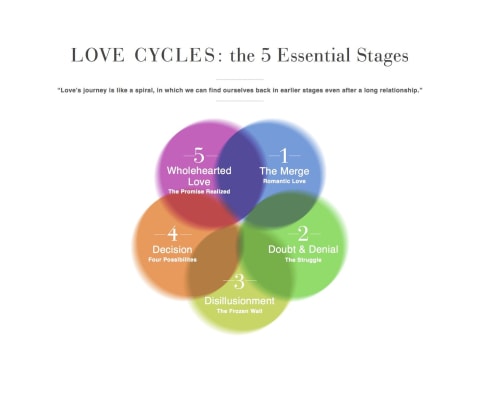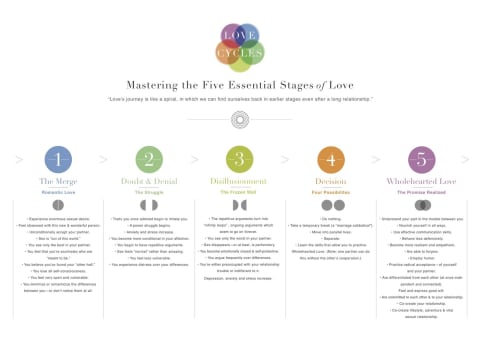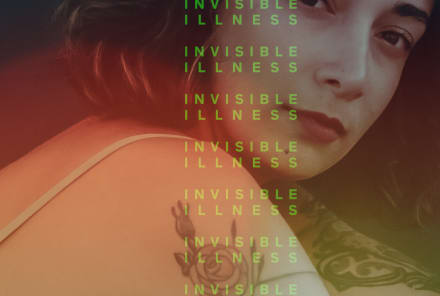Advertisement
How To Stay In Love When You Stop Being Infatuated

My years as a student of psychology, literature, poetry, and mythology — plus 35 years as a couples therapist — have taught me that we experience love as a series of cycles. They are predictable, and therefore universal enough for me to name: First comes the Merge, followed by Doubt and Denial, then Disillusionment, Decision, and, finally, Wholehearted Loving. After talking about this for decades, I finally put it in my book Love Cycles.
Some people move through these five cycles quietly. Others feel compelled to act out a (potentially explosive) drama. Many of us do a little of both. However they manifest, these developmental stages are built into our relationships.
Though the stages are inevitable, the way we respond to them is not. We don’t have to be drama queens or passive beings, oblivious to what’s happening, if we don’t want to be. We can be self-aware participants, in charge of our lives. The first step, of course, is to know the cycles.

The Merge
The first stage, fueled by a delicious and powerful love potion, is marked by changes in the brain chemistry itself. People become obsessed with the wonder and delight of their new partner. We see only the best in our lover. Everything about them is golden.
The seductive power of this stage may cause us to fall in love with someone not suited for us in the long run. At a later stage, we will need to get back in touch with the rational part of our brain to act in our best interests.
Even if our partner is a good match, we cannot bask in the glow of enchantment for long. Not even the power of love can save us from the difficulties and annoyances two human beings bring to one another. The love potion does wear off.
Doubt and Denial
We wake up from the trance of infatuation and begin to see each other as separate people. Now the same qualities that once seemed so perfect begin to annoy us: His reliability feels rigid, her generosity seems irresponsible. Feelings of love mix with alienation and irritation, because friction is natural once we rub up against each other’s differences. Power struggles increase, and we wonder at the change in our partner.
As our disappointment escalates, so do our biological responses to stress. Our reactions vary. Depending on our personality and circumstances, we may want to fight, or to flee, or to stay, if in camouflage. For example, you may feel the need to fight to defend your values, which may actually translate into the desire to have everything your own way. It makes little sense to expect another person to be just like we are, and yet, at some level, many of us do tend to ask, “Why aren’t you me?”
Alternatively, you may be the kind of person who can’t bear conflict. Once the love bubble bursts, you’re out of there. If you do stay, you shut your ears to every dissonant chord and pretend that everything is wonderful, or at least tolerable.
It’s hard to give up the idea of a perfect partner, but we can choose how to respond. We can try our best to offer goodwill and kindness, even as tension thickens. We can consciously decide to work to increase our sense of tolerance and acceptance.
Unfortunately, these possibilities don’t tend to surface during this cycle. No longer blind with infatuation, we discover this person at our side is just not as great as we thought they were: Welcome to the third stage — disillusionment.
Disillusionment
At this point, trouble seems to be all there is. By now our differences are familiar territory, and we’re locked in battles that go over the same ground (i.e., infinity loops). The sexual part of our relationship may come to a halt, and resentment and point scoring may be what we deal in instead of that initial admiration and ability to see all of the good in each other.
In this third stage, when our brain signals major alarm, it is vital to choose to move from reaction to rationality. When we are calmly present, we are free to act for the highest good of the relationship rather than out of fear and neediness.
Of course, because we’re human, we won’t always respond to our lover from our highest selves. At times, jealousy, anger, hurt, and pride will get the best of us. Then what? Can we apologize, make amends, and take responsibility for how we’ve behaved, despite what our partner has done to upset or annoy us? We have the power to make that choice.
Decision
This is the crisis point. We make a decision, even if only to decide to do nothing: to stay with the status quo, no matter how miserable. Or we may continue to live together but to lead separate lives otherwise, without the hope of intimacy. If we do make the choice to part ways, can we wish our former partner the best? If that’s too hard, can we at least not wish them the worst?
Another possibility is to decide to learn the skills that make relationships thrive and to practice them.
Wholehearted Loving
If we make this last choice, we take the opportunity to learn the lessons that will help us become the best people we can be, even as we give our relationship the chance to grow and deepen. It is in this last stage that we come to love wholeheartedly.
Some of us are lucky enough to enjoy a strong connection with the same partner for a long stretch. Regardless of the quality of our intimate relationship, however, our emotional and spiritual journey begins and ends within us. In this sense, every relationship is an inside job. Inside us is where it starts — and inside is where it ends too.

For more on how to keep your relationship happy and healthy, start here:
Watch Next
Enjoy some of our favorite clips from classes
Enjoy some of our favorite clips from classes
What Is Meditation?
Mindfulness/Spirituality | Light Watkins
Box Breathing
Mindfulness/Spirituality | Gwen Dittmar
What Breathwork Can Address
Mindfulness/Spirituality | Gwen Dittmar
The 8 Limbs of Yoga - What is Asana?
Yoga | Caley Alyssa
Two Standing Postures to Open Up Tight Hips
Yoga | Caley Alyssa
How Plants Can Optimize Athletic Performance
Nutrition | Rich Roll
What to Eat Before a Workout
Nutrition | Rich Roll
How Ayurveda Helps Us Navigate Modern Life
Nutrition | Sahara Rose
Messages About Love & Relationships
Love & Relationships | Esther Perel
Love Languages
Love & Relationships | Esther Perel











